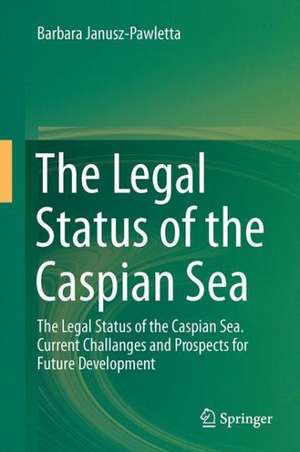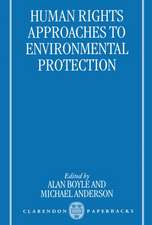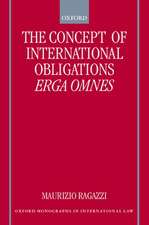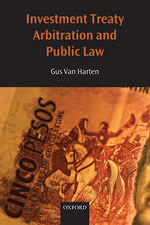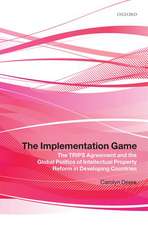The Legal Status of the Caspian Sea: Current Challenges and Prospects for Future Development
Autor Barbara Janusz-Pawlettaen Limba Engleză Hardback – 2 dec 2014
| Toate formatele și edițiile | Preț | Express |
|---|---|---|
| Paperback (2) | 573.10 lei 6-8 săpt. | |
| Springer Berlin, Heidelberg – 22 aug 2016 | 573.10 lei 6-8 săpt. | |
| Springer Berlin, Heidelberg – 23 iul 2022 | 778.13 lei 6-8 săpt. | |
| Hardback (2) | 482.72 lei 39-44 zile | |
| Springer Berlin, Heidelberg – 2 dec 2014 | 482.72 lei 39-44 zile | |
| Springer Berlin, Heidelberg – 22 iul 2021 | 784.13 lei 6-8 săpt. |
Preț: 482.72 lei
Preț vechi: 603.39 lei
-20% Nou
Puncte Express: 724
Preț estimativ în valută:
92.37€ • 98.77$ • 77.01£
92.37€ • 98.77$ • 77.01£
Carte tipărită la comandă
Livrare economică 14-19 aprilie
Preluare comenzi: 021 569.72.76
Specificații
ISBN-13: 9783662447291
ISBN-10: 3662447290
Pagini: 188
Dimensiuni: 155 x 235 x 16 mm
Greutate: 0.45 kg
Ediția:2015
Editura: Springer Berlin, Heidelberg
Colecția Springer
Locul publicării:Berlin, Heidelberg, Germany
ISBN-10: 3662447290
Pagini: 188
Dimensiuni: 155 x 235 x 16 mm
Greutate: 0.45 kg
Ediția:2015
Editura: Springer Berlin, Heidelberg
Colecția Springer
Locul publicării:Berlin, Heidelberg, Germany
Public țintă
ResearchCuprins
Introduction
and
course
of
the investigation.- Geography,
politics
and
economy
in
the
Caspian
Sea.- Legal
history
and
the
present
state
of
use
of
the
Caspian
resources.- Cooperation
levels
in
Caspian
states’
practice
in
the
1990s.- Interrelations
between
territorial
delimitations
and
the
regime
of
the
use
of
the
Caspian
Sea.- The
regime
for
the
use
of
non-living
resources
in
the
Caspian
Sea.- The
legal
regime
of
the
living
resources
of
the
Caspian
Sea.- The
legal
regime
of
the
pipelines
in
the
Caspian
Sea.- The
legal
regime
of
maritime
shipping
on
the
Caspian
Sea.- Protection
of
the
Marine
Environment
of
the
Caspian
Sea.- Concluding
remarks.
Textul de pe ultima copertă
This
book
analyzes
the
legal
and
economic
situation
concerning
the
removal
and
allocation
of
the
natural
resources
in
the
Caspian
Sea
–
the
largest
enclosed
body
of
salt
water
in
the
world,
which
not
only
constitutes
a
fragile
ecosystem
with
great
fishery
resources,
but
is
also
rich
in
oil
and
gas
deposits.
The
economic
advantages
gained
from
the
development
of
oil
and
gas
are
the
basis
for
the
economic
and
social
development
of
the
riparian
states,
but
also
cause
significant
transboundary
harm
to
the
ecosystem
of
the
Caspian
Sea.
The
book
contends
that,
if
the
local
environment
grows
more
heavily
contaminated
through
the
extraction
of
mineral
resources,
it
could
lead
to
environmentally
induced
violence.
It
describes
the
ongoing
conflicts,
which
are
primarily
due
to
various
riparian
states’
territorial
claims
concerning
the
extraction
of
oil
and
gas
resources,
and
argues
that
the
current
legal
framework
on
the
use
and
protection
of
the
Caspian
Sea
is
obsolete.
Thus,
the
main
objective
of
the
book
is
to
point
out
corresponding
international
legal
mechanisms
that
could
be
used
in
order
to
settle
these
disputes
and
protect
the
Caspian
Sea’s
fragile
environment
from
transboundary
harm.
Caracteristici
Overview
of
existing
legal
framework
on
development
of
natural
resources
of
the
Caspian
Sea
Special emphasis on the legal requirement regarding the protection of the unique ecosystem of the Caspian Sea
Legal assessment of the possible future resolution of the interstate dispute over the use of natural resources of the Caspian Sea
Special emphasis on the legal requirement regarding the protection of the unique ecosystem of the Caspian Sea
Legal assessment of the possible future resolution of the interstate dispute over the use of natural resources of the Caspian Sea
Notă biografică
Since 2011 the author is building up and supervising the regional MA Program on Integrated Water Management in Central Asia at the German-Kazakh University in Almaty on behalf of DAAD (German Academic Exchange Service). Since 2016 the author is the UNESCO Chair-holder for water management in Central Asia. Her teaching and research fields cover legal framework and institutional interstate cooperation including on water and energy nexus. As Vice Rector on International Cooperation and Public Relations at Kazakh-German University the author continues to enhance positive water diplomacy in the region. She is also the editor-in-chief, of the Journal of the Central Asian Journal of Water Research (CAJWR), which is an open-access, peer-reviewed e-Journal dedicated to all aspects of water management in the region of Central Asia. Also, the author has a membership at the Technical Committee of the Global Water Partnership (GWP) and at International Law Association within the Committee “Role of International Law in Sustainable Natural Resource Management for Development”.
